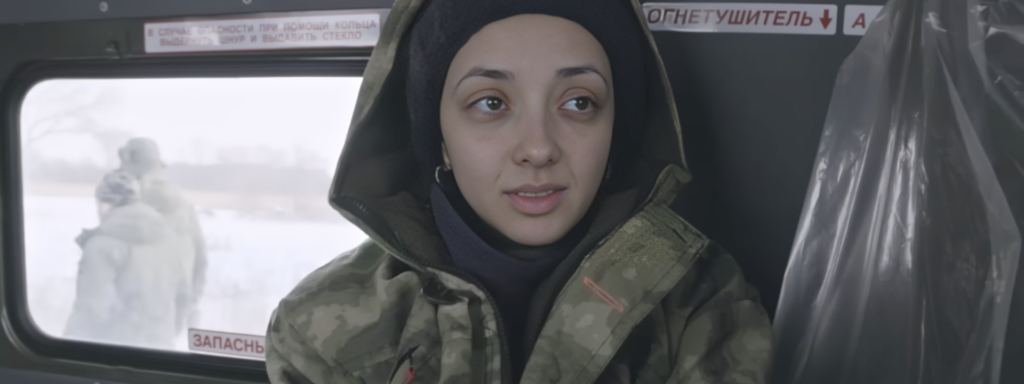by Hudson Moura
(Professor of Politics & Film at the Toronto Metropolitan University and Film Commentator for Radio Canada)
The French-Canadian documentary Russians at War by Anastasia Trofimova offers a multifaceted look at the soldiers involved in the ongoing Russia-Ukraine conflict, though it steers clear of promoting any clear ideology. Instead, the film presents a confusing and often contradictory array of statements from Russian soldiers, who appear lost and discouraged. Many do not have a clear understanding of why they are fighting or the purpose of the war. Most of them echo sentiments like, “I’m just following orders; it’s either me or them.”
The history between Russia and Ukraine extends far beyond geopolitics. It involves shared cultures and families torn apart by a political decision that disregarded these common bonds. This underlying narrative complicates the soldiers’ perspectives, and at times, it is difficult to grasp the context or intent of their interviews.
There’s an overarching sense of helplessness and futility, as reflected in lines like, “There was an order to invade, and we did it. Some don’t know if it’s right or not. It’s me or them. We’re a little wrong, and so are they. We just fight.” In certain scenes, Russian soldiers are even seen helping local Ukrainians, some of whom support Russia due to the belief systems instilled in them growing up.
The film’s emotional core comes from a question asked by the widow of a Russian soldier, “Who needs this war?” Her answer is haunting: “No one… not any wife, mother, or child.” The documentary seeks to expose this sentiment to all of Russia.
Trofimova herself remarks on the human element of the conflict, emphasizing that these soldiers “weren’t superhuman or evil.” She describes the war as a machine that “dragged many to the front, exploiting their sense of patriotism, friendship, and compassion,” but admits that “the real goals of the war remain unclear” to her. A pregnant medic soldier encapsulates the futility of the conflict by saying, “90% of the war is all lies. Someone’s making money off this. How do I explain this to my child?”

Director’s Mistakes: A Flawed Yet Vital Examination
Despite its significance, Russians at War does suffer from certain structural and narrative weaknesses. One notable flaw is the omission of the filmmaker’s positionality, a crucial element in any first-person documentary. While Trofimova introduces herself as Russian, she neglects to mention Canada—a country that is not only deeply involved in the Ukrainian conflict but also the producer of the film. This omission creates a gap in contextual understanding for viewers, especially given Canada’s prominent role in the narrative backdrop.
Moreover, the film’s premise lacks clarity. Trofimova explains that she was inspired to make the documentary after meeting a Ukrainian who chose to fight for Russia. However, this intriguing narrative thread is not fully explored, and the film does not focus on Ukrainians fighting for Russia as initially suggested. Instead, the documentary features fragmented conversations with Russian soldiers, which, while compelling, leave viewers questioning the film’s central theme and overall direction.
In one instance, a soldier asks, “What is this film about?” Another responds, “It’s about us… about ‘Pravda’ (truth)… not what we see on TV.” This ambiguous exchange highlights the film’s lack of a cohesive message but also emphasizes its raw and unfiltered nature. The use of the word “Pravda” is particularly striking, given the context of a Canadian production. It evokes associations with Dziga Vertov, the Russian filmmaker who coined the term Kino-Pravda (“film-truth”), a concept that had a profound influence on Canadian cinema through Cinéma Vérité. This historical reference adds another layer of complexity to the film, though it is not fully developed or addressed within the documentary itself.
The documentary leaves many threads underdeveloped, which detracts from its overall impact and may lead to confusion among viewers, making it appear closer to propaganda. Nonetheless, its rawness and unpolished approach provide valuable insight into the chaos of war.
A Necessary Film for Today’s Canadian Audience
Russians at War is a film that deserves to be seen, particularly in a country like Canada, where open dialogue and the presentation of multiple perspectives are integral to democratic life. Canadians have the right to hear both sides of an issue, even if the film flirts with propaganda. Yet, in this case, the film does not fit neatly into the category of propaganda, as it avoids promoting any clear or unified ideology.
It’s critical to note that Canada is not a dictatorship, despite the efforts of some Ukrainians who wish to prevent Canadians from accessing a film produced by their own governmental film institutions. The same government that funds Ukraine’s war efforts also allowed the creation of this documentary. Trofimova’s work prompts a deeper question: Should Canada support dialogue between the two nations instead of merely financing one side of the conflict?
In the end, the film’s Franco-Canadian production background makes the accusations of Russian propaganda even less plausible. As one Ukrainian official in Canada remarked in a interview at Radio Canada, “The Russians are very sophisticated when it comes to propaganda.” However, this film was not produced by Russia, but by Canadian and French institutions, including TVO and Ontario Creates. Suggesting that these organizations unknowingly participated in Russian propaganda seems far-fetched.
Given these factors, Russians at War cannot be classified as propaganda. Instead, it is a nuanced and challenging documentary that compels viewers to confront uncomfortable realities. It is a vital contribution to the ongoing negotiations in the Russia-Ukraine conflict and deserves to be seen and debated in Canada today.